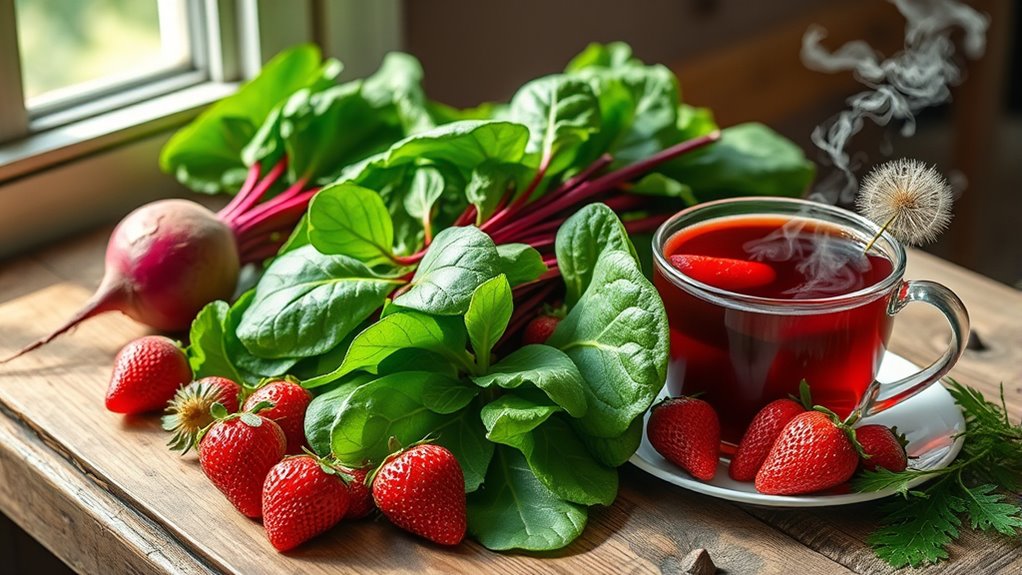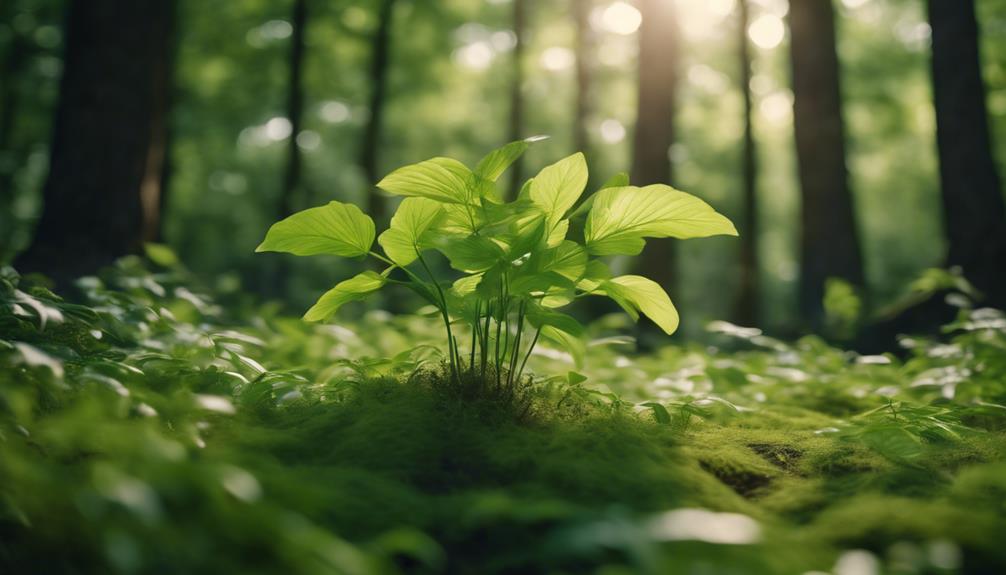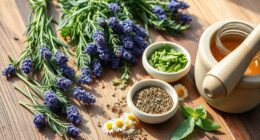If you’re looking to fight fatigue from anemia naturally, incorporating iron-rich herbal sources like nettle, dandelion, and yellow dock into your diet can help boost your energy levels. Drinking herbal infusions or teas made from these plants enhances absorption, especially when paired with vitamin C-rich foods. Cooking or fermenting greens increases bioavailable iron. Following safety tips and adopting healthy lifestyle habits will optimize these remedies, and there’s more to discover on how to support your well-being effectively.
Key Takeaways
- Incorporate iron-rich herbs like yellow dock, nettle, and dandelion into teas and meals to naturally boost iron levels.
- Pair herbal iron sources with vitamin C-rich foods to enhance absorption and combat anemia-related fatigue.
- Use fermented greens and cooked leafy vegetables to improve iron bioavailability and reduce absorption inhibitors.
- Combine herbal infusions such as nettle and rose hips for synergistic effects on iron absorption and energy enhancement.
- Maintain healthy lifestyle habits, including regular exercise, adequate sleep, and stress management, to support herbal remedies’ effectiveness.
The Role of Iron in Supporting Energy and Well-Being
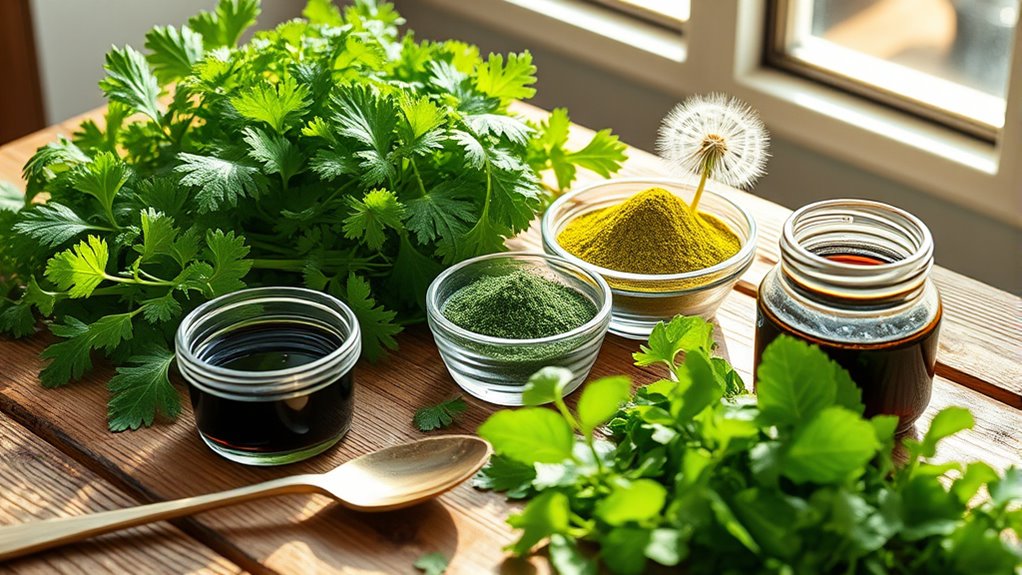
Iron plays a essential role in maintaining your energy levels and overall well-being. It helps your body produce hemoglobin, the protein in red blood cells that carries oxygen from your lungs to tissues and organs. Without enough iron, your cells don’t get sufficient oxygen, leading to feelings of fatigue and weakness. Iron also supports your immune system, helping you fight off illnesses more effectively. Additionally, it’s indispensable for proper brain function, influencing your concentration and mood. When your iron levels are balanced, you’re more alert, energized, and resilient against stress. On the other hand, iron deficiency can cause anemia, which severely impacts your daily life. Ensuring adequate iron intake is essential for maintaining your vitality and overall health.
Top Herbal Sources Rich in Iron
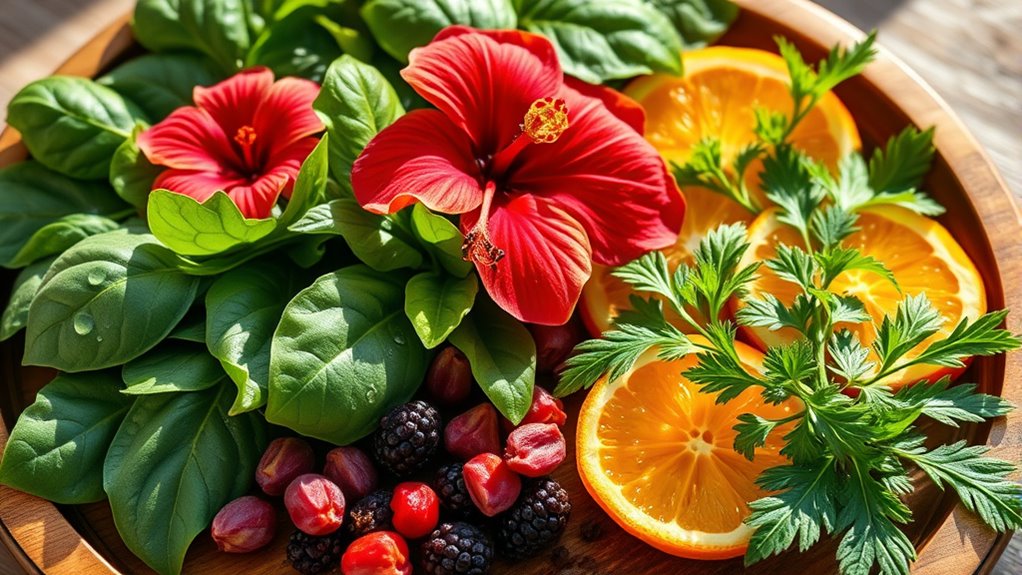
Many herbs naturally contain high levels of iron, making them valuable additions to your diet if you’re looking to boost your intake. Herbs like yellow dock, nettle, and dandelion are especially rich in this mineral. Yellow dock leaves can be brewed into teas or added to salads, providing a gentle iron boost. Nettle, when dried or fresh, is often used in soups and teas to enhance iron levels. Dandelion greens are versatile and can be added to smoothies or cooked dishes for extra nutrients. These herbs not only supply iron but also provide other vitamins and minerals that support overall health. Incorporating these herbal sources into your daily meals or teas can help combat fatigue caused by iron deficiency naturally.
Fermented and Cooked Greens for Better Iron Absorption

Cooking and fermenting greens can considerably enhance your body’s ability to absorb iron. When you cook greens like spinach, kale, or collards, their oxalate levels decrease, making iron more bioavailable. Fermentation, on the other hand, introduces beneficial probiotics that help break down plant compounds inhibiting iron absorption. This process also increases levels of certain vitamins, like vitamin C, which further boosts iron uptake. By soaking, cooking, or fermenting greens, you reduce anti-nutrients that block iron absorption, ensuring your body gets more of this essential mineral from plant sources. Incorporate these methods into your meal prep to maximize iron intake naturally. These simple techniques can make a significant difference in fighting fatigue caused by iron deficiency.
How Herbs Like Nettle and Dandelion Boost Iron Levels
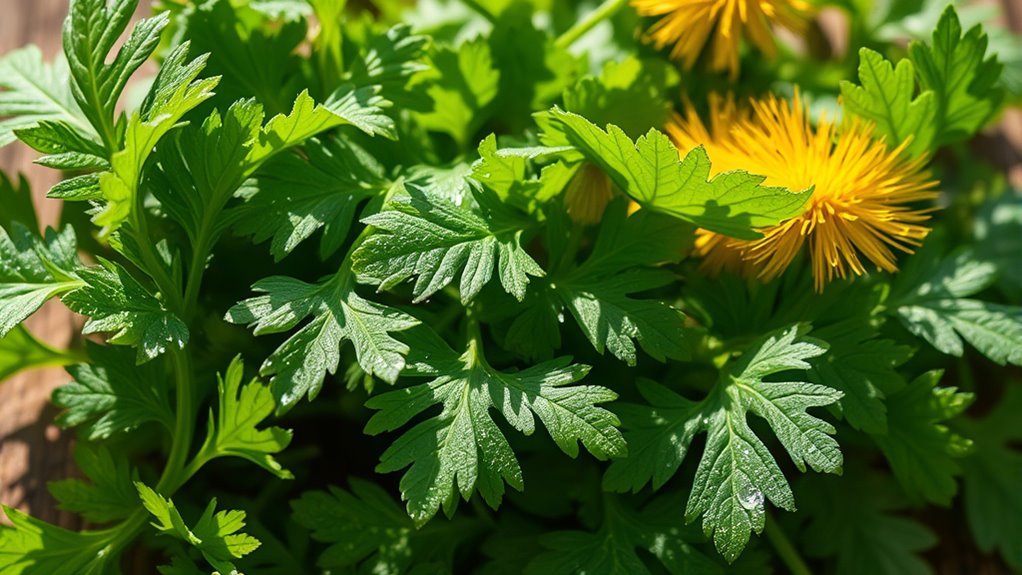
Nettle and dandelion are packed with nutrients that help increase your iron levels naturally. Dandelion’s high iron content makes it a powerful addition to your diet, while nettle provides essential vitamins that enhance absorption. Together, they act as natural boosters, making it easier for your body to utilize iron effectively.
Nutrients in Nettle
Have you ever wondered how herbs like nettle can naturally boost your iron levels? Nettle is packed with essential nutrients that support your body’s iron needs. It contains a notable amount of non-heme iron, which your body can absorb and use effectively. Besides iron, nettle offers vitamin C, which helps enhance iron absorption from plant sources. It also provides a rich array of vitamins A and K, along with minerals like magnesium, calcium, and potassium, all *crucial* for maintaining healthy blood and energy levels. These nutrients work together to combat fatigue and strengthen your blood. Including nettle in your diet or herbal teas can be a simple, natural way to support your iron levels and improve overall *vitality*, especially if you’re dealing with anemia.
Dandelion’s Iron Content
Dandelion is a potent herbal source of iron that can help boost your levels naturally. It contains a notable amount of iron, making it a valuable addition to your diet if you’re aiming to improve your iron intake. Beyond iron, dandelion also provides vitamins and minerals that support overall blood health. You can enjoy dandelion by adding the leaves to salads or brewing them into teas. Its slightly bitter flavor can complement many dishes, making it easy to incorporate into your daily routine. While it’s not a miracle cure, regular consumption can contribute to increasing your iron stores over time. Just remember, combining dandelion with other iron-rich foods maximizes its benefits and supports your fight against fatigue caused by anemia.
Natural Absorption Enhancers
Herbs like nettle and dandelion don’t just provide iron; they also contain compounds that enhance its absorption in your body. Nettle, for example, is rich in vitamin C, which helps convert iron into a form your body can easily absorb. Dandelion contains bitter compounds that stimulate your digestive system, improving nutrient uptake, including iron. These herbs also support healthy stomach acid production, which is essential for absorbing non-heme iron from plant sources. By incorporating nettle and dandelion into your diet, you not only increase your iron intake but also maximize how much your body actually absorbs. This dual action makes them powerful allies in fighting fatigue caused by iron deficiency, ensuring you get the most benefit from the iron-rich foods and herbs you consume.
Incorporating Herbal Teas and Infusions for Iron Support
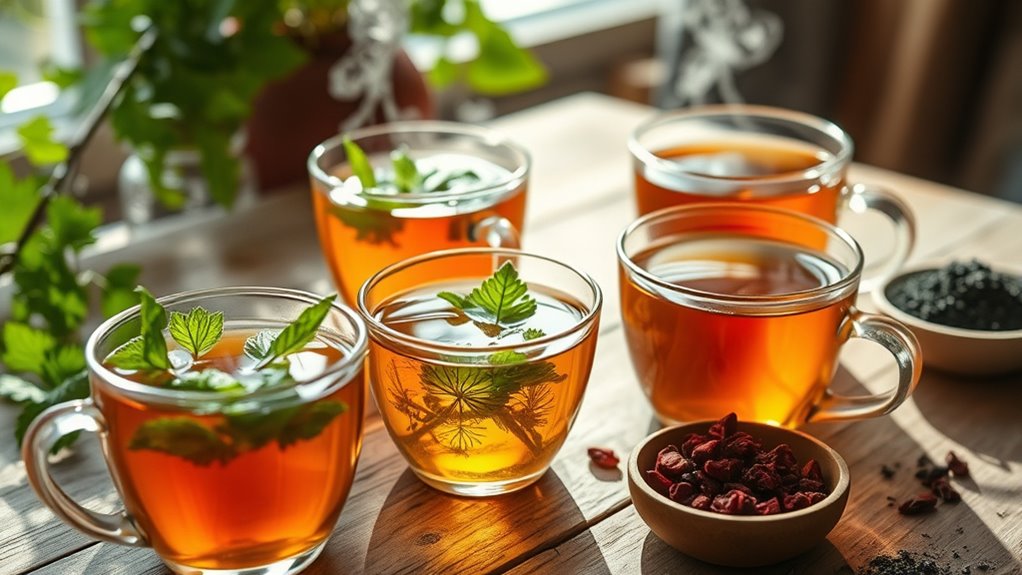
You can boost your iron intake by drinking herbal teas rich in iron, like nettle or yellow dock. Combining herbs in infusions can enhance absorption and maximize benefits. Experimenting with different herb blends helps you create potent teas tailored to your iron support needs.
Herbal Teas Rich in Iron
Have you considered herbal teas as a natural way to boost your iron intake? Certain herbal teas contain plant-based compounds that are relatively high in iron, making them a beneficial addition to your diet. For example, nettle tea is well-known for its iron content and can help support your hemoglobin levels. Dandelion root tea also offers small amounts of iron along with other nutrients that promote overall blood health. Drinking these teas regularly can supplement your iron intake, especially if you’re sensitive to iron supplements or prefer natural remedies. Remember, consistency is key, and incorporating these herbal infusions into your daily routine may help combat fatigue caused by anemia. Just make sure you’re also balancing your diet with other iron-rich foods for optimal results.
Infusions for Improved Absorption
To maximize iron absorption from herbal infusions, pairing them with certain nutrients and avoiding inhibitors is essential. Consuming vitamin C-rich herbs like rose hips or hibiscus alongside iron-infused teas can markedly boost absorption. Conversely, avoid infusions with tannins or calcium, which hinder iron uptake. Incorporate small amounts of citrus or berry extracts into your herbal teas to enhance iron bioavailability. Additionally, timing matters—drink these infusions between meals rather than with them to prevent absorption interference. Be mindful of your body’s response, and adjust herbal combinations accordingly.
- Use vitamin C-rich herbs to enhance absorption
- Avoid tannin- or calcium-heavy infusions during iron intake
- Consume herbal infusions between meals for better absorption
- Combine with citrus or berry extracts to boost bioavailability
Combining Herbs for Potency
Combining different herbal teas and infusions can substantially boost their iron-supporting effects. By blending herbs like nettle, dandelion, and yellow dock, you enhance nutrient absorption and maximize iron intake. Each herb offers unique benefits: nettle enriches your blood with iron and vitamin C, while dandelion supports digestion and nutrient assimilation. Incorporating these into your daily routine creates a powerful, natural remedy against fatigue. You can prepare a balanced infusion by mixing dried herbs and steeping them together, or alternate teas throughout the day. Keep in mind that combining herbs not only boosts potency but also adds variety to your regimen. This approach helps you harness the full potential of herbal medicine, making your fight against anemia more effective and enjoyable.
The Benefits of Combining Herbal Remedies With a Nutritious Diet
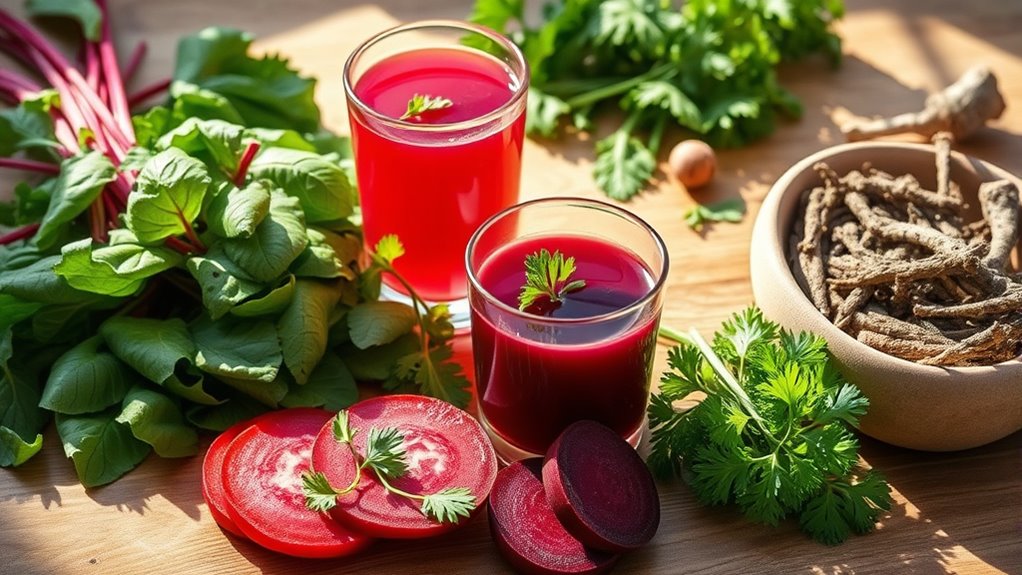
Integrating herbal remedies with a nutritious diet can markedly enhance your body’s ability to absorb and utilize iron. When you combine iron-rich herbs like nettle or dandelion with foods such as leafy greens, lean meats, and legumes, you maximize iron intake and absorption. This synergy not only boosts your energy levels but also supports overall health. To maximize benefits, consider including vitamin C-rich foods like citrus or bell peppers, which improve iron absorption. Additionally, avoiding inhibitors like tea or coffee during meals ensures your body makes the most of your iron sources. By pairing herbal remedies with a balanced diet, you create a powerful approach to fight fatigue and combat anemia naturally. This strategy ensures your body gets sustained, effective support for ideal iron levels.
Safety Tips and Precautions When Using Herbal Iron Boosters

While herbal remedies can effectively support iron levels, it’s important to use them securely and responsibly. Before starting any herbal supplement, consult with a healthcare professional, especially if you’re pregnant, nursing, or on medication. Some herbs may interact with other drugs or cause side effects like stomach upset or allergic reactions. Stick to recommended dosages and avoid excessive use, as too much iron can lead to toxicity. Always buy from reputable sources to ensure quality and safety. Keep track of your symptoms and iron levels to monitor progress and catch any adverse reactions early. If you experience side effects such as nausea, dizziness, or abdominal pain, stop use and consult your healthcare provider. Safety should always come first when using herbal iron boosters.
Lifestyle Habits to Complement Herbal Iron-Enhancing Strategies
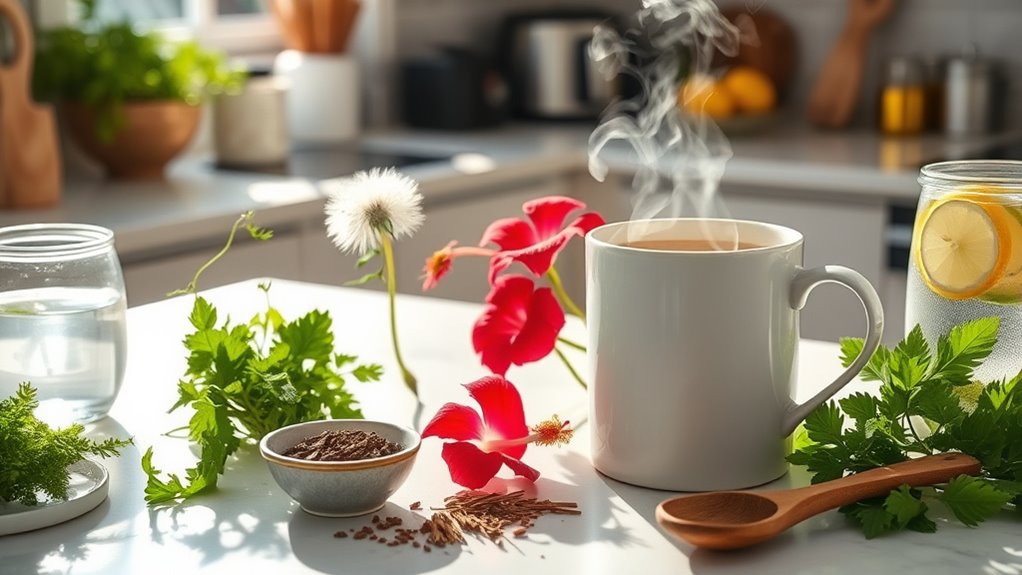
Adopting healthy lifestyle habits can substantially enhance the effectiveness of herbal iron-boosting strategies. Your daily choices influence how well your body absorbs and utilizes iron. Prioritize a balanced diet rich in vitamin C, which helps improve iron absorption. Stay consistent with regular exercise to boost circulation and overall energy levels. Avoid tea, coffee, and calcium-rich foods around iron-rich meals, as they hinder absorption. Make sure you get enough sleep to support recovery and immune function, both crucial for peak iron utilization.
- Incorporate foods high in vitamin C like citrus or bell peppers
- Limit consumption of inhibitors during iron-rich meals
- Practice stress management to prevent fatigue and support nutrient absorption
- Maintain hydration to aid nutrient transport and digestion
Frequently Asked Questions
Can Herbal Iron Boosters Replace Conventional Anemia Treatments?
Herbal iron boosters can complement conventional anemia treatments but shouldn’t replace them without your healthcare provider’s approval. They may help increase iron levels naturally and reduce fatigue, but their effectiveness varies. Always consult your doctor before making changes to your treatment plan. Relying solely on herbal remedies might leave you deficient if your anemia is severe. Combining medical guidance with herbal support offers the safest, most effective approach.
Are There Any Side Effects From Long-Term Use of Herbal Iron Sources?
Long-term use of herbal iron sources can have side effects, but they’re generally mild. About 20% of users report digestive issues like nausea or constipation after prolonged use. You might also risk iron overload if you consume excessive amounts, which can damage organs. It’s best to monitor your intake and consult a healthcare professional to avoid potential problems, especially if you’re using herbal supplements over an extended period.
How Do Herbal Remedies Compare to Supplements in Iron Absorption?
Herbal remedies often contain compounds that enhance iron absorption naturally, like vitamin C-rich herbs, making them potentially more effective than synthetic supplements. You might find that herbal sources are gentler on your stomach and better absorbed, especially when combined with foods that boost iron uptake. However, individual responses vary, so it’s wise to consult a healthcare professional to determine which option suits your needs best and guarantees ideal iron absorption.
Can Herbal Teas Interfere With Prescription Medications?
Yes, herbal teas can interfere with prescription medications. Some herbs contain compounds that may alter how your medications are absorbed or metabolized, potentially reducing their effectiveness or causing side effects. For example, green tea’s tannins can affect iron absorption, and St. John’s Wort can interfere with antidepressants. Always consult your healthcare provider before adding herbal teas to your routine, especially if you’re on medication, to avoid any interactions.
What Signs Indicate Herbal Iron Therapy Is Ineffective?
If herbal iron therapy isn’t working, you’ll notice persistent fatigue, dizziness, or pale skin despite consistent use. You might also experience ongoing shortness of breath or cold hands and feet. If your laboratory tests still show low hemoglobin and iron levels after several weeks, it’s a sign the treatment isn’t effective. In that case, consult your healthcare provider to assess for other underlying issues or alternative treatments.
Conclusion
Think of herbal iron boosters as your guiding lantern through the fog of fatigue. By embracing these natural allies, you illuminate your path toward renewed energy and vigor. Just as a lantern reveals hidden truths in darkness, herbs reveal your body’s true strength. Keep shining brightly with mindful choices, blending tradition and nutrition. Your journey to vibrant health is a steady flame—nurture it, and watch your vitality glow brighter each day.

